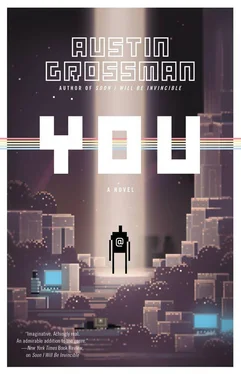“I did.”
“What happened?”
“It’s gone; something happened to it while I was away. Nothing there but sand and stone buildings. Empty fountains, beautiful mosaics.”
“Shit.”
“Let’s not talk about it.”
“So what happened at the end of the Third Age?”
“I thought I’d explained all that before. Weren’t you listening? Magic ended.”
He saw me off at the Porter Square T stop. He stood on the platform and waved to me as my train pulled away, the only wizard left alive in our time, if he even was alive. In his robes and beard he looked sad and homeless for a moment, but then he winked at me and mimed a golf stroke.
PART V

CLANDESTINE, OR THE SPY WHO LOVED YOU
C landestine (1988)
Clandestine dated from senior year, the year Darren left high school for good, the year after Simon finally quit his job at Kinko’s to live full-time at UMass. He didn’t find an apartment. By that time he was a sort of unofficial mascot of the undergrad computer science lab. He’d drift from dorm room to dorm room or to a student lounge. One or another CS major would pretend to lose his access card and pass it on to Simon, who was such a constant presence in the lab that faculty and staff never bothered to ask for a student ID. The students knew who he was, of course—the eccentric genius behind the Realms games—and his nascent career as a homeless person only raised him in their esteem. He was a kind of avatar of the hard-core spirit. It helped that he really was brilliant and could defy the conventional wisdom of what was possible on a regular basis.
The Realms games were a success but starting to feel like a trap. Darren in particular wanted new worlds to conquer. Fantasy was limiting their demographic.
“People look at a video game and all they see is a bunch of dwarves flying around and purple explosions and nothing makes sense,” he said. “So why should a normal person bother playing?”
“It only takes a few minutes to figure it out,” Simon said.
“But instead they can just go see a movie, which takes zero seconds to figure out,” Lisa put in.
“And movies are about people,” said Darren. “We need that. We don’t do people, but we will. We’ll have better graphics—”
“Better writing,” Lisa said.
“—something more like a movie,” said Darren. “Like James Bond, or Casablanca .”
“So how do we do that? Graphics technology is never going to look like a movie,” Simon said. He had a point, in 1988. CD-ROM drives were scarcely an idea as a consumer game format, and the first basic real-time 3-D games were at least three years away.
“We can do it. What if players got to be Humphrey Bogart? They get to actually lounge around at Rick’s. Looking cool. Everyone would want it.”
“I’m picturing a player getting bored,” said Lisa. “I’m picturing Humphrey Bogart leaving Rick’s to find something to do. I’m picturing an expressionless Humphrey Bogart running through the streets of Casablanca, killing Nazis and taking their bullets and looking for secret doors. I picture Humphrey Bogart ruling a desolate Casablanca he has stripped utterly of life and treasure.”
“Everybody wants to be Humphrey Bogart,” said Darren. “Right? There must be a way. It’s 1987, for God’s sake.”
With those words the Clandestine franchise was born, in the persons of Nick Prendergast, agent of MI6 and cheap James Bond knockoff, scourge of the Soviet security apparatus; the missing Laura, Nick’s lost first love, for whom he was on an eternal quest; and his implacable foe, the devious German spymaster Karoly.
Black Arts had a mint-condition copy. I opened the box to find a thick manila envelope containing a game manual, fake period newspaper clippings, a decoder wheel, and a cloth map of Paris showing Nick’s apartment, his favorite bar (Le Canard), message drop points, important characters’ houses, and an inset giving details of the Paris Catacombs. Finally, a mock classic-noir movie poster showed Nick peering through fog in a trench coat. You could feel it—Black Arts was swinging for the fences on this one, doing what video games had become addicted to doing: challenging the top dog of twentieth-century media, the movies, and trying to beat them at their own game. I wondered if they’d succeed. And I had the fleeting thought that maybe one of them built Clandestine with an eye to escaping the black sword, on the theory that it wouldn’t leave Endoria to menace Paris.
cd qp\clandestine
clandestine.exe
import saved game? (Y/N)
It began with a narrow cobblestone street somewhere in Paris, which had high buildings on either side, their plaster facades streaked and dirty. It was a foggy early morning. The sun has just risen as a fortyish man hurries along in a black winter coat and white cravat, his face grim and set at the end of a long night. He glances back once, then hurries on. As his footsteps die away, the title appears over the empty screen:
BLACK ARTS
PRESENTS…
CLANDESTINE
I remembered, now, playing this one. That summer the game was my failed birthday present to my father, to go with his new PC, but I wound up the only one who ever played it—alone, after the family had gone to bed.
I played obsessively, with no hint book, and I would remain stuck on the same puzzle for days, repeatedly searching a woman’s dressing room at the Comédie-Française, or wandering the Catacombs in search of a secret door, or puzzling over a German cipher.
I followed Nick’s adventures while wasting the summer driving aimlessly through my area of the suburbs, making my own trip west to visit a girl at Amherst College until she broke it to me that we were only friends. I spent a sleepless night on the floor next to her bed before getting up at six to drive the ninety-five miles back to my Harvard summer-school dorm room, where I would surprise my roommate and his girlfriend, who had expected me to be gone for the weekend. That summer I saw Montmartre and the Champs-Élysées for the first time, I got drunk for the first time on the train to Rome. I decided to become an English major. Years later I happened on one of the source photos that had been digitized for the occupation montage, and was overwhelmed with the memory of that sadness and the sweet smell of my father’s tobacco.
I honestly wasn’t quite sure I wanted to play the game again, but I knew it would look different this time. I was a different person now.
I had a roommate freshman year who was obsessed with it. I noticed it from the outside as just an unusually pretty game, blues and purples. His girlfriend used to refer to it as “that video game that’s, like, not really a video game.” And it didn’t look like one; it looked like an artsy cartoon crossed with a complex board game, one with the elegance of a deluxe Clue set.
It was a palpable technological step forward. The Commodore 64 was a graphics powerhouse for its day. These were no longer the crayon drawings of earlier games. Clandestine delivered lushly picturesque, sixteen-color backdrops of interwar Paris in warm blues and oranges, blocky and vivid and memorable, like an image stitched into a Persian rug.
Nick Prendergast was not really a spy at all, just a twenty-two-year-old fresh from Oxford with a second in Modern Greats who got mixed up with the kind of racy aristocratic set that tended to stumble into intelligence work. Nick Prendergast was still two-dimensional in those days, a lovingly drawn, animated paper doll in his tawdry, fourth-floor walk-up apartment in the cinquième arrondissement.
Читать дальше






![Ally Carter - [Gallagher Girls 01] I'd Tell You I Love You But Then I'd Have to Kill You](/books/262179/ally-carter-gallagher-girls-01-i-d-tell-you-i-lo-thumb.webp)






